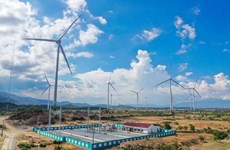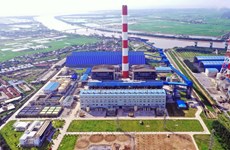Livestock industry structural reform needed: official
Hoang Thanh Van from the Department of Agriculture and Rural
Development, spoke to Tin Tuc (News) newspaper of Vietnam News Agency
(VNA) about the country's plans to improve its livestock sector before
free trade agreements take effect next year.
Hoang Thanh Van from the Department of Agriculture and Rural
Development, spoke to Tin Tuc (News) newspaper of Vietnam News Agency
(VNA) about the country's plans to improve its livestock sector before
free trade agreements take effect next year.
Q: What challenges is the livestock sector facing?
A: Last year was a difficult year for livestock production, due to the increase in animal feed costs and the declining meat price.
This situation drove many farmers into debt. Not only did they suffer these losses, but they were also hit hard by epidemics, including foot-and-mouth disease, blue-ear disease and swine flu.
The signing of the Trans-Pacific Partnership (TPP) agreement, which is expected to take place this year, will inevitably put pressure on our livestock producers, particularly when it comes to price.
At present, our products are already more expensive than imports. As a result, it is imperative for us to take proactive measures to avoid the serious consequences that could occur when the TPP goes into effect.
Q: Has the livestock production sector prepared for the upcoming integration process?
A: What we have to do right now is to speed up the structural reform of the livestock industry with a focus on two areas: improving the quality of breeds and creating a legal corridor to tighten breeding management.
We will encourage enterprises and researchers to conduct experiments to select high breeds and import good breeds in order to do cross-breeding, which can produce new high-quality breeds.
We paid special attention to the quality of our animal breeds in 2013, yet we don't think that is enough. We have to apply scientific techniques to create new high-quality breeds, thus ensuring sustainable livestock production.
To raise a 100-kilo pig, a farmer has to spend about 4 million VND (190 USD), of which feed costs account for about 70 percent. However, nowadays, our animal feeds depend heavily on imported materials.
This is an issue we have to look into closely if we want to improve the productivity of the livestock industry.
Also we must improve our work in epidemic prevention and surveillance.
Q: Do you think that livestock producers should adopt a safer approach?
We have called on the farmers to adopt a safer approach by raising organic livestock and following the VietGap standards.
This helps reduce animal and poultry diseases and protect people's health. Safe livestock production also helps increase the comparative advantages of our livestock products against imports in the same categories.-VNA
Q: What challenges is the livestock sector facing?
A: Last year was a difficult year for livestock production, due to the increase in animal feed costs and the declining meat price.
This situation drove many farmers into debt. Not only did they suffer these losses, but they were also hit hard by epidemics, including foot-and-mouth disease, blue-ear disease and swine flu.
The signing of the Trans-Pacific Partnership (TPP) agreement, which is expected to take place this year, will inevitably put pressure on our livestock producers, particularly when it comes to price.
At present, our products are already more expensive than imports. As a result, it is imperative for us to take proactive measures to avoid the serious consequences that could occur when the TPP goes into effect.
Q: Has the livestock production sector prepared for the upcoming integration process?
A: What we have to do right now is to speed up the structural reform of the livestock industry with a focus on two areas: improving the quality of breeds and creating a legal corridor to tighten breeding management.
We will encourage enterprises and researchers to conduct experiments to select high breeds and import good breeds in order to do cross-breeding, which can produce new high-quality breeds.
We paid special attention to the quality of our animal breeds in 2013, yet we don't think that is enough. We have to apply scientific techniques to create new high-quality breeds, thus ensuring sustainable livestock production.
To raise a 100-kilo pig, a farmer has to spend about 4 million VND (190 USD), of which feed costs account for about 70 percent. However, nowadays, our animal feeds depend heavily on imported materials.
This is an issue we have to look into closely if we want to improve the productivity of the livestock industry.
Also we must improve our work in epidemic prevention and surveillance.
Q: Do you think that livestock producers should adopt a safer approach?
We have called on the farmers to adopt a safer approach by raising organic livestock and following the VietGap standards.
This helps reduce animal and poultry diseases and protect people's health. Safe livestock production also helps increase the comparative advantages of our livestock products against imports in the same categories.-VNA












